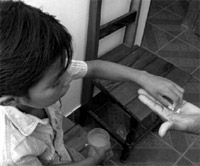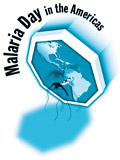| December 2008 Edition |
Communicable Diseases
Experts: Don't Let Up in the Fight against Malaria

Countries participating in the RAVREDA network have made significant improvements in recent years in diagnosis and treatment of malaria. Photo by David Spitz/PAHO
Malaria cases have declined by 32 percent in Latin America and the Caribbean since 2000, and mortality has dropped 39 percent. But there are still some 1 million new cases each year, and more than 140 million people in the PAHO region are at risk of the disease.
"Malaria is a problem not just for health but for social and economic development," said Jarbas Barbosa, manager of PAHO's Health Surveillance and Disease Management area. "We need to strengthen national capacity to fight this problem in our region. We have the infrastructure, commitment, strategy, and tools to eliminate malaria."
Matthew Lynch, director of the Global Program on Malaria at the Johns Hopkins Bloomberg School of Public Health, echoed the theme of this year's event, "Malaria is a global burden calling for a global solution through local efforts," saying, "We don't have far to go to achieve regional elimination. That makes today a once-in-a lifetime opportunity. This will strengthen the global effort by showing that we're so close, we can't stop now."
 In the mid-20th century, control efforts succeeded in eradicating malaria from North America and most of the Caribbean and dramatically reduced it in Central and South America. However, cutbacks in funding-in response to the decline in cases-eventually brought a resurgence in a number of countries. Later efforts again reduced malaria but failed to eliminate it.
In the mid-20th century, control efforts succeeded in eradicating malaria from North America and most of the Caribbean and dramatically reduced it in Central and South America. However, cutbacks in funding-in response to the decline in cases-eventually brought a resurgence in a number of countries. Later efforts again reduced malaria but failed to eliminate it.
Much of the recent progress is due to improvements in malaria treatment in countries that share the Amazon Rainforest. In 2000, Bolivia, Brazil, Colombia, Ecuador, Guyana, Peru, Suriname, and Venezuela joined together with support from the Amazon Malaria Initiative, spearheaded by PAHO and the U.S. Agency for International Development (USAID). Responding to World Health Organization findings that malaria parasites had developed resistance to traditional anti-malarial drugs, the countries formed the Amazon Network for the Surveillance of Antimalarial Drug Resistance (RAVREDA) to assess the development of drug resistance in the Amazon Region. RAVREDA documented the growth of resistance to single-drug treatments, and the countries then collectively introduced artemisinin-based combination therapies to replace them.
"This is a good example of how crossborder collaboration and consensus-building can be used to achieve a public health impact," said Trenton Ruebush, a USAID expert on malaria. Today RAVREDA is being used to improve laboratory diagnosis of malaria and to build member country capacity in entomology and pharmaceutical testing.
Lynch said effective advocacy was crucial to ensure that malaria remains a priority on the health agenda. "We need to sustain our commitment to funding at high levels even in the face of low prevalence. This is essential to get to elimination." To encourage this, he said advocates need to document the benefits of malaria control for ministers of finance, show that the tools are effective and affordable, and ensure that monitoring and surveillance "are seen as a good investment."
Strengthening health systems is also key, said PAHO's top malaria expert, Keith Carter. "We cannot just be content to say, here are the drugs that work. Health workers and service providers have to be clear when talking to patients about how they should take these drugs. And it's not just a question of getting the drugs to the ministry of health in the capital city, when patients are getting sick out in rural areas.We need to train people in the use of these tools and we need to ensure good coverage."
"Malaria Champions" to be honored in 2009
For next year's Malaria Day in the Americas, PAHO plans to highlight "best practices" by honoring a select group of "Malaria Champions of the Americas." The honors will go to individuals, institutions, groups, and projects that have contributed significantly to the fight against malaria at the community, country, regional, or global level. The nominating process is set to begin on April 25, 2009, with winners to be honored on Malaria Day 2009, Nov. 6. For more information please contact This email address is being protected from spambots. You need JavaScript enabled to view it. at PAHO.